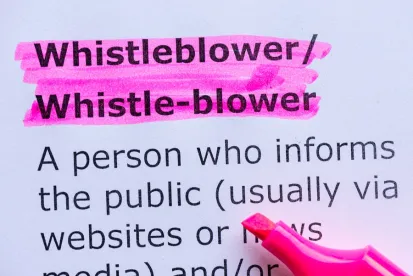On April 2, 2019, the U.S. District Court for the Northern District of Alabama denied a defendant-employer’s motion for summary judgment on a SOX whistleblower retaliation claim, finding genuine issues of material fact existed as to the basis for Plaintiff’s discharge, whether his complaint qualified as protected activity, and whether he had a reasonable belief that the complained-of activity was unlawful. Shea v. Kohl’s Dept. Stores, Inc., No. 16-cv-01155.
Background
Defendant, a retailer, employed Plaintiff as a regional District Manager for Alabama and Georgia. Defendant used a number of performance metrics used to evaluate stores, including daily credit applications. It offered monetary incentives to encourage sales associates to ask each customer about opening a credit account. Additionally, store managers’ bonuses were tied to the store’s performance on credit solicitation metrics. In September 2015, Plaintiff allegedly began receiving reports from store managers that certain stores were creating fraudulent credit applications to increase reported numbers. He allegedly became aware that one store in particular reported a credit application for every $96.00 in sales, compared to the usual average of one application for every $2,500 to $3,500 in sales. These numbers allegedly concerned Plaintiff, who allegedly discovered sales associates at the store were submitting fraudulent credit applications using the social security numbers of customers and others without authorization. Plaintiff sent an e-mail to the manager of the store and the District Loss Prevention Manager. The e-mail was then forwarded to the Regional Vice President, who was Plaintiff’s supervisor. Plaintiff’s employment was terminated shortly thereafter. Plaintiff proceeded to file suit claiming he was retaliated against in violation of SOX for complaining of allegedly fraudulent conduct.
Ruling
Defendant moved for summary judgment, arguing Plaintiff did not engage in protected activity under SOX because he did not raise his concerns to the appropriate person in the company under the company policy (the policy required employees to raise concerns directly to their supervisor). The court denied the motion, finding Plaintiff had engaged in protected activity because the person he notified, the District Loss Prevention Manager, had authority to investigate the alleged misconduct. The court also rejected Defendant’s argument that Plaintiff lacked a subjectively reasonable belief; it found there was a genuine issue of material fact as to whether Plaintiff had a reasonable belief that unlawful activity was occurring, noting he had said “shady” activity was occurring, which raised a question as to whether he subjectively believed something unlawful was afoot. Finally, the court found Defendant had not substantially rebutted Plaintiff’s prima facie case with its alternative reason for Plaintiff’s termination, noting the close temporal proximity between the reports of the fraud and the termination, and Plaintiff’s favorable performance reviews.
Implications
This court appears to have employed a relatively employee-friendly standard of determining whether an employee has met his or her burden of identifying a violation of one of the types of misconduct enumerated in Section 806 of SOX.





 />i
/>i

